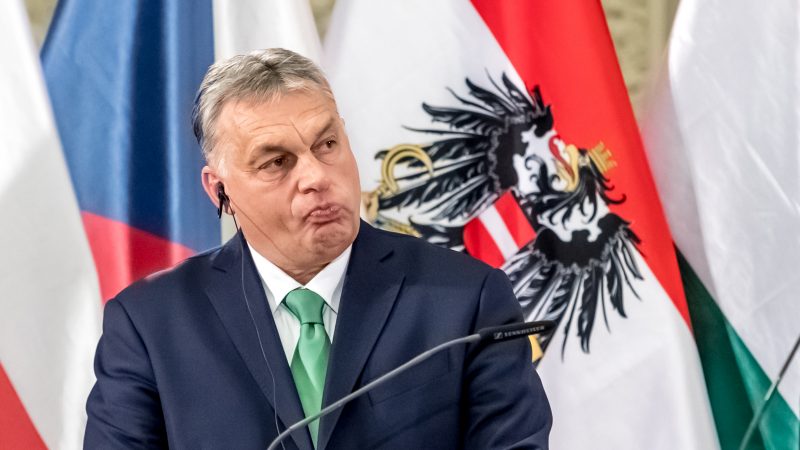A number of governments have come under fire from international organisations for attempting to take advantage of the worldwide coronavirus pandemic to implement a series of measures granting them emergency powers that could threaten freedom of the media.
Hungary is the country hitting the headlines at the moment as Prime Minister Viktor Orbán’s so-called corona virus bill to clamp down on fake news about the epidemic will also grant him the power to rule by decree.
To rule by decree is a style of governance allowing quick, unchallenged approval of the law by a single person or group, and is used primarily by dictators, absolute monarchs and military leaders.
This move raised alarm bells across the international community especially since the draft bill does not include a cut-off date for these measures to remain in effect.
Council of Europe Human Rights Commissioner Dunja Mijatovic expressed her concern at the proposal and said: “even in an emergency, it is necessary to observe the Constitution, ensure parliamentary & judicial scrutiny & right to information”.
The .@CommissionerHR expressed concerns about the lack of a “clear cut-off date” and other safeguards in the proposed legislation. “Even in an emergency, it is necessary to observe the Constitution, ensure parliamentary & judicial scrutiny & right to information,” https://t.co/5QAXUEeoIZ
— Dunja Mijatovic (@Dunja_Mijatovic) March 23, 2020
In a draft bill presented this week, Orban is proposing extending the country’s state of emergency indefinitely and would impose prison sentences of up to five years on those hindering measures that are aimed at containing the spread of the virus and on those spreading false information. The government declared a state of emergency on March 11 which was valid for 15 days and now aims to extend it.
In a statement, the European Centre for Press and Media Freedom (ECPMF), called on European leaders not to exploit emergency measures to legitimise restrictions on press and media freedom in any way.
“Journalists’ access to information must be guaranteed in all cases and by all means”.
They also endorsed the stand taken by the International Press Institute that slammed Orban and called on the EU to take a stand against the attack on press freedom.
The draft legislation threatening journalists and others accused of spreading “false information” with jail “is a step toward total information control and the further suppression of press freedom in the country, the IPI said.
These measures, disguised as legislation to fight the COVID-19 pandemic, in reality conveniently strengthened the government’s authoritarian grip.
Hungarian Justice Min. @JuditVarga_EU sends bill to Parliament:
– State of emergency til end of 2020
– Rule by decree
– Parliament suspended
– No snap elections/referendums
– Spreading fake news and rumors punishable with up to 5 years in prison #COVID19 https://t.co/1QJaLaKp6J— Balazs Csekö (@balazscseko) March 21, 2020
“This law would allow the Hungarian government to back up its usual ‘fake news’ accusations against journalists with the threat of criminal prosecution and even imprisonment”, IPI Deputy Director Scott Griffen said. “The government’s attacks on independent journalists simply for doing their job leave little doubt that this proposal is an effort to cement control over public information and can be used to intimidate what remains of the independent press into self-censorship.”
Andrew Stroehlein, European media director of Human Rights Watch, described it as “dictatorship” in a tweet.
Hungary's ruling party Fidesz – which has been eroding democracy for years – is now using the #coronavirus crisis to take the final steps in its long-time goal:
Dictatorship. https://t.co/feYqd2tqku
— Andrew Stroehlein (@astroehlein) March 21, 2020
But Guardian journalist Carole Cadwalladr issued a warning on social media that this was not something just happening in Hungary but also in the UK, US and the Philippines, among others.
In fact, Maria Ressa, CEO of Filipino media outlet Rappler, pointed out that a draft law was proposed to grant President Rodrigo Duterte 19 special powers to deal with the coronavirus disease outbreak.
In the UK, Prime Minister Boris Johnson has created an uproar in the House of Commons when he presented a draft bill over emergency coronavirus legislation that would hand sweeping powers to the government for two years. He is hoping to fast-track the legislation through Parliament without a vote.
Meanwhile, in recent weeks, US President Donald Trump has invoked emergency powers enabling him to waive certain healthcare regulations and direct enormous streams of cash to areas of need. He also announced that the federal government would use its authority to direct private companies to boost the production of surgical masks, gloves and other equipment, although the status of those efforts was unclear.













